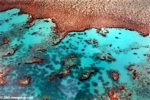A study in the Caribbean has found that coral reefs can recover from global warming impacts, such as coral bleaching, if protected from fishing. Marine biologists have long been worried that coral reefs affected by climate change may be beyond recovery, however the new study published in PLoS ONE shows that alleviating another threat, overfishing, may allow coral reefs to cope with climate change.
Surveying ten sites of coral reefs in the Bahamas for two-and-a-half years the researchers found that even reefs severely damaged by coral bleaching could recover. In marine protected areas—where fishing is not allowed—coral cover increased an average of 19 percent. Coral reef cover outside of marine protected areas however showed no recovery.
“Our research shows that local action to reduce the effects of fishing can contribute meaningfully to the fate of reefs. The reserve allowed the number of parrotfishes to increase and because parrotfish eat seaweeds, the corals could grow freely without being swamped by weeds. As a result, reefs inside the park were showing recovery whereas those with more seaweed were not. This sort of evidence may help persuade governments to reduce the fishing of key herbivores like parrotfishes and help reefs cope with the inevitable threats posed by climate change,” explained Dr. Peter Mumby of the University of Exeter in a press release.
Coral bleaching, whereby corals face high mortality due to loss of vital symbiotic organisms, can be caused by a number of stresses, including higher water temperatures linked to global warming and ocean acidification, which is caused by higher CO2 levels in the ocean.
Despite the evidence of recovery, Mumby maintains that “in order to protect reefs in the long-term we need radical action to reduce CO2 emissions.”
Currently only 2 percent of the world’s coral reefs are in marine protected areas.
Related articles
Climate change causing irreversible acidification in world’s oceans

(12/15/2009) A new study from the Secretariat of the Convention on Biological Diversity has synthesized over 300 reports on ocean acidification caused by climate change. The report finds that increasing ocean acidification in the oceans will lead to irreversible damage in the world’s oceans, creating a less biodiverse marine environment. Released today the report determines that the threat to marine life by ocean acidification must be considered by policymakers at the UN Climate Change Conference in Copenhagen.
Coral reef troubles indicate broader ecological problems
(11/10/2009) Today, many of our planet’s natural areas are seriously threatened by human incursion, overexploitation and global warming: Less than a fifth of the world’s original forest cover remains in unfragmented tracts, while just one-third of coastal mangroves survive to protect coastlines from storms and erosion. But none of these are declining as rapidly as coral reefs. By revealing what could be in store for other natural systems, reefs resemble the proverbial canary in a coal mine.
Tropical storms may create seeds for reef restoration
(05/16/2009) Tropical reefs are easy to destroy and difficult to fix. It is estimated that global warming, unsustainable fishing, and pollution have already destroyed 20% of the world’s coral reefs. Recently, Virginia Garrison and Greg Ward of the United States Geological Survey (USGS) demonstrated how coral fragments that have broken loose during storms can be used to rebuild reefs. They reported their results in the October issue of Biological Conservation.














